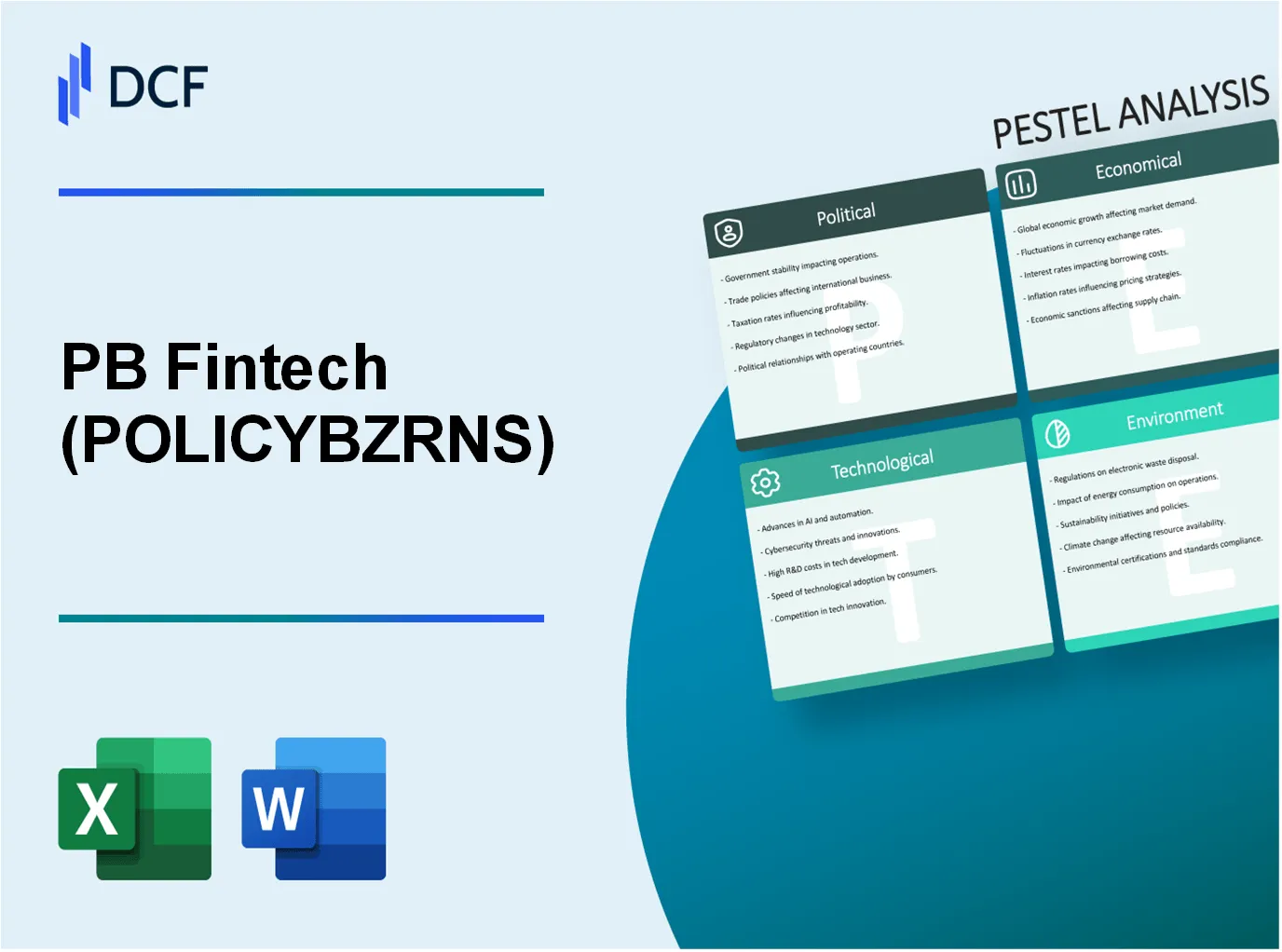In the ever-evolving landscape of finance, PB Fintech Limited stands at the forefront of innovation and adaptability. As a key player in the insurance and investment sector, understanding the multifaceted influences that shape its operations is crucial. Dive into this comprehensive PESTLE analysis to uncover how political stability, economic trends, sociological shifts, technological advancements, legal frameworks, and environmental concerns impact PB Fintech’s business strategies and market performance.
PB Fintech Limited - PESTLE Analysis: Political factors
Government stability is crucial for market operations in India, where PB Fintech Limited operates. The Indian government has maintained a stable political environment, which is essential for investor confidence and business growth. For instance, as of October 2023, India's GDP growth rate stood at 6.3%, reflecting a stable economic backdrop conducive for fintech operations.
The regulatory policies governing the insurance sector in India have seen significant reforms. The Insurance Regulatory and Development Authority of India (IRDAI) has introduced various measures aimed at enhancing transparency and consumer protection. In 2022, the IRDAI released guidelines for digital insurance distribution, which impacted how fintechs like PB Fintech can provide insurance products. Additionally, the insurance penetration rate in India was approximately 3.76% in 2021, indicating potential for growth in digital insurance offerings.
Trade policies and tariffs also play a pivotal role in PB Fintech's business operations. India has pursued policies to boost local manufacturing, which can affect the cost structure for fintech companies that rely on technology imports. For example, the government's "Make in India" initiative encourages domestic production, potentially impacting technology acquisition costs. Import tariffs on electronics can range from 10% to 50%, depending on the product, which could influence PB Fintech's operational expenses.
Foreign investment regulations have evolved in India, with the government allowing 100% FDI in insurance intermediaries under the automatic route since 2021. This creates a favorable environment for PB Fintech to attract foreign investments. In FY 2022, the Indian insurance sector registered foreign investments of approximately INR 1,600 crore, indicating a growing interest from international players.
Political lobbying by industry bodies significantly influences regulations affecting PB Fintech. Organizations like the Internet and Mobile Association of India (IAMAI) advocate for favorable regulatory frameworks for digital finance and insurance. Their efforts have led to the introduction of the Digital India initiative, which aims to increase internet accessibility and digital literacy, thereby bolstering fintech growth. The initiative is projected to increase the number of internet users to 900 million by 2025, creating a larger customer base for companies like PB Fintech.
| Parameter | Value |
|---|---|
| GDP Growth Rate (2023) | 6.3% |
| Insurance Penetration Rate (2021) | 3.76% |
| Import Tariffs on Electronics | 10% to 50% |
| Foreign Investments in Insurance (FY 2022) | INR 1,600 crore |
| Projected Internet Users by 2025 | 900 million |
PB Fintech Limited - PESTLE Analysis: Economic factors
In the financial services sector, economic factors play a pivotal role in shaping the landscape for companies like PB Fintech Limited, which operates in the insurance technology and financial services markets. Key economic indicators such as GDP growth, interest rates, inflation, currency exchange fluctuations, and economic downturns are essential to understand the company's performance.
GDP growth influencing consumer purchasing power
The GDP growth rate of India is a significant determinant of consumer purchasing power. In the fiscal year 2022-2023, India’s GDP growth was recorded at 7.2%, following a recovery from the pandemic-induced slowdown. This growth positively impacts disposable income, enabling consumers to invest more in insurance products. As per the Reserve Bank of India, a consistent growth trajectory fosters higher consumer confidence, urging them to make buying decisions regarding financial products.
Fluctuations in interest rates affecting investment
Interest rates are another critical factor influencing PB Fintech’s investment capabilities. As of October 2023, the Reserve Bank of India’s repo rate stands at 6.50%, which is a key benchmark for lending rates in the economy. An increase in interest rates generally leads to higher borrowing costs, potentially reducing the company's capacity to invest in technology and market expansion. Simultaneously, lower interest rates can stimulate borrowing and investment, leading to growth in insurance uptake.
Inflation rates impacting operational costs
Inflation significantly impacts operational costs for companies in the financial sector. In September 2023, India's inflation rate was reported at 6.4%, surpassing the upper threshold set by the Reserve Bank of India. Elevated inflation leads to increased costs in areas such as technology, marketing, and employee compensation. For PB Fintech, managing these costs is vital for maintaining profitability and competitive pricing in its insurance offerings.
Currency exchange volatility impacting international operations
As PB Fintech Limited engages in various international partnerships and transactions, currency exchange volatility poses a risk. The Indian Rupee (INR) was trading at approximately 82.5 INR against the US Dollar as of October 2023. Exchange rate fluctuations can affect the profitability of investments and the cost of imported technology solutions, thus impacting overall financial health. A depreciation of the Rupee can lead to increased costs while simultaneously affecting revenue derived from international operations.
Economic downturn affecting insurance demand
An economic downturn can severely impact the demand for insurance products. The COVID-19 pandemic highlighted this relationship, where the crisis led to decreased discretionary spending among consumers. For instance, during the initial phases of the pandemic in 2020, the Indian insurance sector witnessed a decline in new premium collections of ~20%. As economic conditions tighten, consumers often prioritize essential spending, leading to reduced uptake of insurance policies, directly affecting PB Fintech's revenue streams.
| Economic Indicator | Current Value | Previous Year | Implications for PB Fintech |
|---|---|---|---|
| GDP Growth Rate | 7.2% | 8.7% | Increased disposable income; potential rise in insurance product purchases |
| Repo Rate | 6.50% | 4.00% | Higher borrowing costs may limit investment in growth initiatives |
| Inflation Rate | 6.4% | 5.0% | Rising operational costs can squeeze margins; pricing strategies required |
| INR to USD Exchange Rate | 82.5 | 73.5 | Currency fluctuations could impact international investment costs |
| New Premium Collection Change (2020) | -20% | N/A | Economic downturn may lead to reduced insurance demand |
PB Fintech Limited - PESTLE Analysis: Social factors
The evolution of consumer behavior significantly impacts PB Fintech Limited, particularly given its focus on technology-driven financial services. This section delves into the various social factors influencing the company.
Sociological
Changing consumer attitudes towards online services
The acceptance of online services has soared, with a reported 82% of consumers preferring online transactions as per a 2023 survey by McKinsey. For PB Fintech, this shift opens opportunities for increased user engagement and the expansion of its digital platforms.
Demographic shifts affecting target market size
India's population is projected to reach 1.5 billion by 2025, with a significant proportion of young individuals aged between 18 to 35 years. This age group accounts for approximately 65% of the total population, representing a vast potential market for PB Fintech's products.
Increasing awareness about financial literacy
Financial literacy initiatives have seen a rise, with reports indicating that 27% of adults in India are financially literate as of 2023, up from 20% in 2018. Enhanced financial literacy is likely to drive demand for financial products offered by PB Fintech.
Social trends influencing insurance product demand
Recent trends show a growing interest in health insurance, especially post-pandemic. The demand for health insurance products has increased by 30% year-on-year, driven by heightened awareness of health risks among consumers. PB Fintech can leverage this trend to enhance its insurance offerings.
Rise of digital adoption among younger demographics
According to a 2023 report by Statista, over 85% of individuals aged 18-29 use online platforms for financial services. This trend illustrates the necessity for PB Fintech to adapt its strategies to cater specifically to younger users, who are increasingly becoming the primary consumers of financial products.
| Social Factor | Statistic | Source |
|---|---|---|
| Consumer Preference for Online Services | 82% | McKinsey 2023 |
| Projected Population of India (2025) | 1.5 billion | UN Population Division |
| Percentage of Financially Literate Adults | 27% | Global Findex Database 2023 |
| Year-on-Year Increase in Health Insurance Demand | 30% | Insurance Regulatory and Development Authority of India (IRDAI) |
| Digital Adoption Rate among Ages 18-29 | 85% | Statista 2023 |
PB Fintech Limited - PESTLE Analysis: Technological factors
Advancements in FinTech solutions have been pivotal for PB Fintech Limited, especially in enhancing operational efficiency. As of 2023, the global FinTech market is projected to reach approximately USD 332.5 billion by 2028, growing at a CAGR of 23.84% from 2021 to 2028. PB Fintech, through its platforms, has integrated various FinTech solutions such as digital lending and automated investment services, which have significantly improved customer engagement and transaction speeds.
Use of big data analytics for customer insights has become a cornerstone of PB Fintech's strategy. The company leverages customer data to tailor its services effectively, which has led to an increase in customer retention rates. Reports indicate that businesses utilizing big data analytics have experienced a 8-10% increase in operating profits. For PB Fintech, this translates to more personalized offerings, addressing the needs of over 20 million users across its platforms.
Cybersecurity measures for data protection are crucial for maintaining customer trust in the digital financial ecosystem. PB Fintech has invested significantly in cybersecurity, with a reported expenditure of over INR 50 crores in 2023. This investment supports advanced encryption methods and continuous monitoring systems to protect sensitive customer information. The company adheres to industry standards, with compliance rates reflecting less than 1% of reported security breaches.
Increasing mobile internet penetration in India has profoundly impacted PB Fintech's growth. As of Q1 2023, mobile internet penetration in India reached approximately 53%, with over 700 million internet users accessing financial services via mobile devices. This trend has enabled PB Fintech to expand its reach, offering services through mobile applications that cater to the growing user base effectively.
Adoption of AI for personalized customer experiences is another technological driver for PB Fintech. The company has integrated AI algorithms to analyze user behavior and preferences, leading to enhanced customer experiences. In 2023, it was reported that companies employing AI in customer engagement saw a 25% increase in customer satisfaction. Furthermore, PB Fintech aims to increase its AI-driven solutions by 30% over the next two years to stay competitive in the digital finance landscape.
| Technological Factor | Current Status | Impact | Future Growth |
|---|---|---|---|
| FinTech Solutions | Market projected at USD 332.5 billion by 2028 | Enhanced operational efficiency, improved transaction speeds | CAGR of 23.84% from 2021 to 2028 |
| Big Data Analytics | 8-10% increase in operating profits reported | Improved customer retention rates, personalized services | Targeting more than 20 million users |
| Cybersecurity Measures | INR 50 crores spent in 2023 | Less than 1% reported security breaches | Continuous improvement of data protection |
| Mobile Internet Penetration | 53% penetration in Q1 2023 | Access for over 700 million internet users | Further increase anticipated in user base |
| AI Adoption | 25% increase in customer satisfaction | Enhanced customer experience through personalization | 30% growth in AI-driven solutions targeted in next 2 years |
PB Fintech Limited - PESTLE Analysis: Legal factors
Compliance with data protection laws is a critical factor for PB Fintech Limited, particularly given its focus on technology-driven financial services. According to India's Information Technology Act and the Personal Data Protection Bill, companies handling personal data are required to implement strict data security measures. Non-compliance can lead to penalties that are generally set at up to ₹5 crore or 2% of the company's total worldwide turnover, whichever is higher.
Insurance regulations significantly impact PB Fintech’s operations. The Insurance Regulatory and Development Authority of India (IRDAI) oversees the insurance sector, enforcing compliance with the Insurance Act 1938. For instance, as of fiscal year 2023, the IRDAI mandates a solvency ratio of at least 1.5 for insurance companies, which directly influences how PB Fintech structures its financial products and services.
In terms of intellectual property rights, PB Fintech must ensure that its proprietary technology is protected under the Patents Act, 1970. The average cost of filing a patent in India can range between ₹20,000 to ₹40,000, depending on complexity, and the time for patent approval can take up to 4 years. This protection is crucial for maintaining a competitive edge in fintech innovation.
Employment and labor law compliance is vital for PB Fintech, especially as the company expands its workforce. The Minimum Wages Act, 1948, sets minimum wage levels across various sectors, impacting payroll costs. As of 2023, the average minimum wage in major Indian cities is approximately ₹15,000 to ₹20,000 per month. Additionally, non-compliance with the Employees' Provident Fund Act can result in penalties that escalate quickly, adding to financial liabilities.
Legal challenges from customer disputes also present risks for PB Fintech. The Consumer Protection Act, 2019, enables consumers to file complaints against entities that fail to deliver services as promised. In the financial services sector, cases of mis-selling or inadequate service can lead to significant legal costs, with fines potentially reaching up to ₹1 crore or more for severe violations.
| Legal Factor | Relevant Law/Regulation | Financial Implications |
|---|---|---|
| Data Protection | IT Act, Personal Data Protection Bill | Penalties up to ₹5 crore or 2% of turnover |
| Insurance Regulations | Insurance Act 1938, IRDAI Guidelines | Solvency ratio must be at least 1.5 |
| Intellectual Property Rights | Patents Act, 1970 | Cost of patent filing ₹20,000 to ₹40,000 |
| Employment Law Compliance | Minimum Wages Act, Employees' Provident Fund Act | Payroll costs of ₹15,000 to ₹20,000 per month |
| Customer Disputes | Consumer Protection Act, 2019 | Fines up to ₹1 crore |
PB Fintech Limited - PESTLE Analysis: Environmental factors
Corporate responsibility towards climate change initiatives
PB Fintech Limited has committed to corporate social responsibility, striving to align its operations with global climate goals. The company has pledged to reduce its carbon footprint by 30% by 2030. In 2022, it initiated a program aimed at tree plantation, targeting the planting of 100,000 trees over the next five years, enhancing biodiversity and contributing to carbon offsetting.
Impact of environmental regulations on operations
As environmental regulations become more stringent, especially in India, PB Fintech Limited faces increased compliance costs. In FY 2022, compliance-related expenses rose by 15%, reflecting heightened regulatory standards. The company has invested approximately INR 200 million in enhancing its operational sustainability to meet these regulations.
Investment in sustainable technology solutions
PB Fintech Limited is focusing on sustainable technology, allocating around INR 500 million towards the development of eco-friendly digital solutions by 2025. This includes enhancing their online platforms to reduce energy consumption and implementing data centers powered by renewable energy sources, which is expected to decrease operational energy use by 25%.
Climate risks affecting insurance business models
The insurance sector, in which PB Fintech operates, is significantly impacted by climate risks. A report by the Insurance Regulatory and Development Authority of India (IRDAI) indicated that climate-related claims could rise by 20% annually due to increased natural disasters. PB Fintech Limited has noted a potential increase in operational risk, estimating that 5% to 10% of their portfolio could be affected by climate risks over the next five years.
Consumer preference for environmentally friendly practices
Recent surveys indicate a shift in consumer preferences towards environmentally friendly practices. Over 70% of consumers in India now prefer businesses that demonstrate a commitment to sustainability. PB Fintech Limited has reported a 25% increase in customer engagement in 2023 as a result of its green initiatives, suggesting a positive correlation between sustainability efforts and consumer loyalty.
| Environmental Factor | Data/Impact |
|---|---|
| Carbon Footprint Reduction Target | 30% by 2030 |
| Tree Plantation Initiative | 100,000 trees by 2027 |
| Compliance Cost Increase (FY 2022) | 15% |
| Investment for Sustainability Compliance | INR 200 million |
| Investment in Eco-Friendly Technology Solutions | INR 500 million by 2025 |
| Projected Increase in Climate-Related Claims | 20% annually |
| Portfolio Risk Estimation | 5% to 10% affected by climate risks |
| Consumer Preference for Sustainability | 70% prefer sustainable companies |
| Increase in Customer Engagement (2023) | 25% increase due to green initiatives |
As PB Fintech Limited navigates the complexities of the PESTLE landscape, it illustrates the intricate interplay of external factors shaping its strategic decisions. With political stability, economic fluctuations, and technological advancements at the forefront, understanding these dynamics is essential for investors and analysts alike to gauge the company's resilience and growth potential in the ever-evolving FinTech sector.












